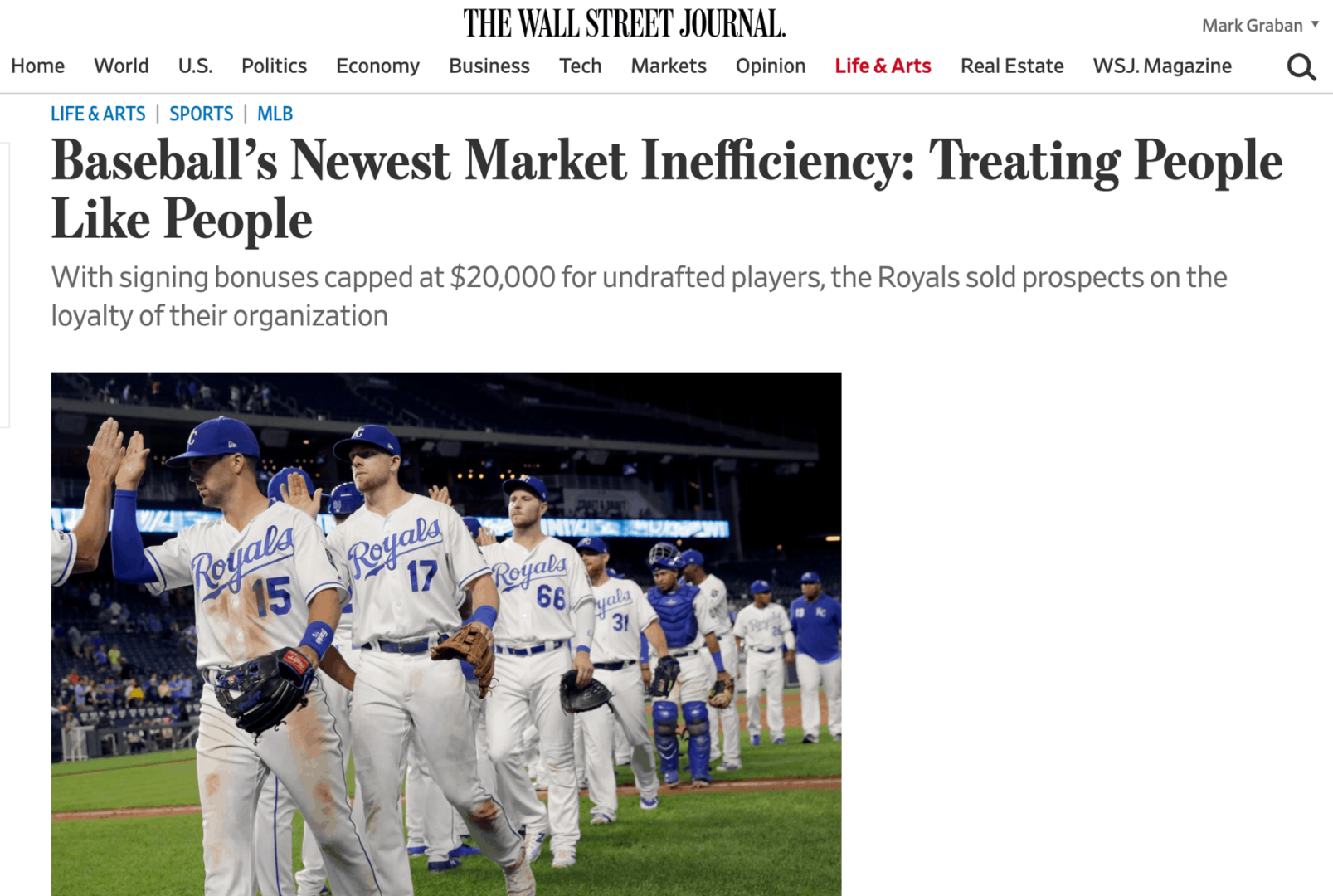“Respect for people” is, of course, a core tenet of Lean and the Toyota Production System. It's an important idea in the workplace and beyond.
I was really happy to see this article in the WSJ:
Baseball's Newest Market Inefficiency: Treating People Like People

Imagine that, treating people like people. There's a bit of an uncomfortable dynamic in sports, where players are drafted — they're told by a sports cartel where they are able to work. Players are bought and sold and traded like property… it's unlike any other workplace or industry.
Minor league baseball players are already paid a paltry sum (below the poverty line). It's like any industry that will take advantage of people in terms of unpaid internships or other subpar pay — there's always somebody willing to do it. Yes, some top prospects get huge signing bonuses, but that's the exception.
During the Covid-19 pandemic — and all of the uncertainty about when we'll have sports again — some MLB teams have cut costs by releasing players in their “farm systems.”
“Baseball teams released around 1,000 prospects with the industry on pause, mostly to avoid giving them a paltry weekly stipend of $400.”
I heard a joke somewhere that “stipend” must be Latin for “low pay.”
MLB, in another cost cutting move, shortened the length of this year's draft from 40 rounds to just five. That means more players are free agents and can shop their services around. More players get a choice over who to sign with. That's a good opportunity.
The Kansas City Royals are realizing that treating people well can be a competitive advantage.
[One prospect, Kale Emshoff] decided to hold those words [about loyalty and a family environment] up to real-world scrutiny, by asking each of them the same question:
Did you cut any minor leaguers during the sport's pandemic-related hiatus?
In just about every case, he already knew the answer. Baseball teams released around 1,000 prospects with the industry on pause, mostly to avoid giving them a paltry weekly stipend of $400. Faced with Emshoff's pointed inquiry, most potential suitors faltered and made excuses.
Except for one: the Kansas City Royals. Emshoff agreed to sign there by 6 p.m.
Emshoff had inquiries from 25 of the 30 MLB organizations. He was highly recruited. A highly-recruited college graduate in any normal professional would have a similar choice — the opportunity to choose an employer based on pay, culture, and other factors. The tech companies don't get to draft computer science graduates from the top schools.
The Minnesota Twins also deserve some credit:
While most of Kansas City's competitors wavered on paying minor leaguers at all this summer–and then released scores of them–only the Royals and Minnesota Twins said they would keep every prospect.
I love how this is stated:
“… the Royals positioned themselves to take advantage of a very simple market inefficiency: not treating your lowest-paid employees like garbage.”
And I love this comment, which could apply to leadership in any setting:
“We shouldn't be applauded for that,” [Kansas City Royals General Manager Dayton] Moore said in an interview this week.
“That's just what you're supposed to do. If you accept the responsibility of a leadership position, it begins with putting others first, and if you can't do that, you don't deserve the privilege to lead.”
That really reminds me of what the late, great Paul O'Neill said about leadership — it's about serving others. O'Neill said that everybody in an organization deserves dignity and respect, if they are a top surgeon or a housekeeper.
More on the role of leaders, from the WSJ article:
They saw any cuts as an abdication of their responsibility to do the right thing–“not the most popular thing or the thing that creates the bottom line,” Moore said.
It might hurt the bottom line in the short term. But these teams, like Toyota, are making decisions for the long term.
The very first point in “The Toyota Way” approach says:
“Base your management decisions on a long-term philosophy, even at the expense of short-term financial goals.”
It starts at the top, in this case the new owner of the Royals:
Moore credited owner John Sherman, who bought the Royals for about $1 billion in November, for accepting his advice and footing the bill while others didn't.
Another player summed it all up like this:
“The respect goes a long way,” [Tucker] Bradley said. “You see someone get treated right, you want to be a part of it.”
As Moore said:
“You've got to look big-picture all the time and do what's best for the game.”
I hope we see more of this — not just in baseball.
How many health systems have responded to the Covid-19 crisis (which is also a financial crisis for healthcare) by laying off the lowest-paid in the organization?
Please scroll down (or click) to post a comment. Connect with me on LinkedIn.
Let’s work together to build a culture of continuous improvement and psychological safety. If you're a leader looking to create lasting change—not just projects—I help organizations:
- Engage people at all levels in sustainable improvement
- Shift from fear of mistakes to learning from them
- Apply Lean thinking in practical, people-centered ways
Interested in coaching or a keynote talk? Let’s start a conversation.










While it’s great to see so many on the periphery of the industry (e.g. baseball writers) pushing for teams to pay minor leaguers fair wages, feed them properly, handle their expenses (believe me, the cost of covering these costs to be *just* the best system in organized baseball is very much a drop in the bucket), it’s still so frustrating to not see teams taking this small leap. Investing in your minor leaguers – teaching them about handling money and budgets, teaching English to international players, teaching them about nutrition and training – would provide dividends tenfold. Players would want to be in your organization. Your players in your organization would be better prepared for adult life while playing a kid’s game, and they are less likely to wash out of the sport penniless and without any useful adult skill to their name.